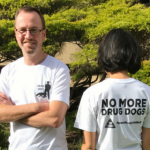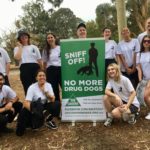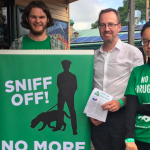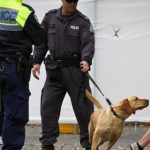Don’t Bring the Drug Dogs Back: An Interview With Sniff Off’s Xiaoran Shi
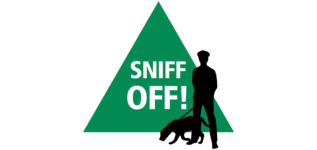
On the evening of 10 September, the Sniff Off Facebook page alerted its close to 85,000 followers that police officers with a drug dog had been spotted at Blacktown Station.
The post noted that this was the first time a sniffer dog sighting had been confirmed since the onset of the COVID-19 restrictions.
On the following evening, NSW police officers with an accompanying sniffer dog were spotted at Central Station, while others were seen harassing the public with a dog at Mount Druitt.
So, it seems that despite NSW citizens having been out of lockdown since mid-May, the NSW Police Force has determined that the social climate hasn’t warranted this flawed method of sniffing out illicit substances up to this point, but for some reason, it does now.
Get sniffed
Launched in 2011, Sniff Off is a collaboration between NSW Greens MLC David Shoebridge and the NSW Young Greens. The campaign aims to bring about an end to the warrantless use of drug dogs in public places by the police.
Shoebridge has obtained the NSW police statistics in regard to drug dog use going back as far as 2009. And the shocking thing about the data is it reveals that when a person is searched as a result of a positive indication, no illicit substances are found two-thirds to three-quarters of the time.
In 2006, when the use of drug dogs in public was relatively new, the NSW Ombudsman released a report detailing that the dogs get it wrong 74 percent of the time, and when they do get it right, it’s overwhelmingly for small quantities of cannabis for personal use.
Incidentally, the ACT legalised the use and personal possession of up to 50 grams of cannabis on 31 January this year, which means the entire NSW public is being scrutinised over what the majority of the time turns out to be a crime that’s completely lawful over the border in the nation’s capital.
Akin to sexual assault
But this isn’t the worst of it. Shoebridge also obtained figures via freedom of information laws in mid-2018, that revealed NSW police had doubled its use of strip searches following a positive drug dog indication over the two years prior.
This means that if officers don’t find drugs on an individual as a result of a regular search, following an indication by a sniffer dog, police are then subjecting an ever-growing number of civilians to a strip search that most of the time turns up nothing.
And despite NSW police commissioner Mick Fuller claiming there’s been no policy change regarding heightened strip search use, since March last year his force has seen fit to set up screens at Central Station, so officers can make commuters disrobe behind them following a dog indication.
Sydney Criminal Lawyers spoke to Sniff Off page administrator Xiaoran Shi about the Berejiklian government’s form when it comes to drug dogs, the impact it’s having on the general public, and how a sensible way out of the sniffer dog dilemma exists.
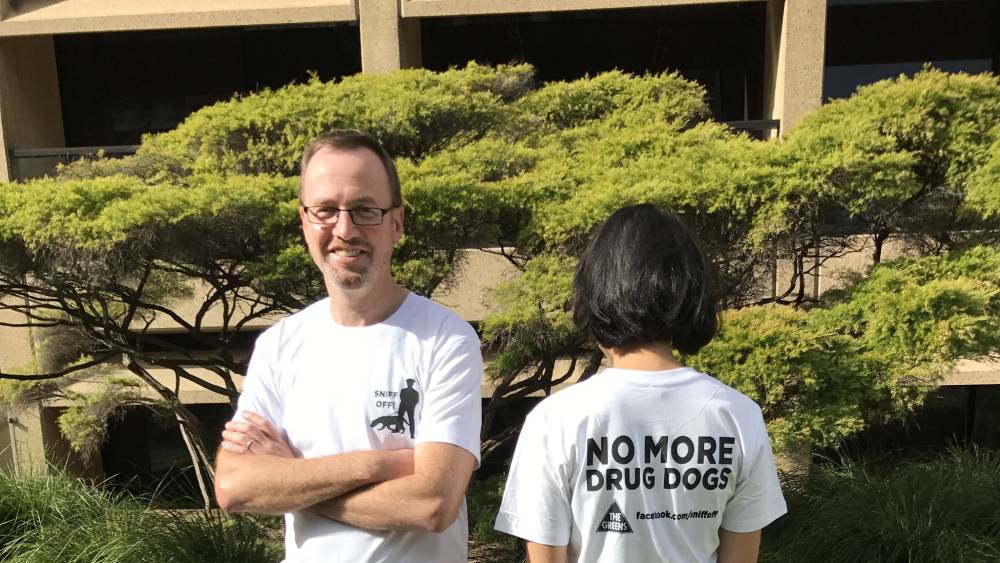
Last week, the Sniff Off page received its first drug dog report since the pandemic restrictions came into play. Although, NSW citizens haven’t been in lockdown for months now.
Xiaoran, considering authorities removed the dogs for quite a while without any major issues, what do you think this tells us?
The NSW Liberal government is committed to waging its failed war on drugs, despite expert recommendations from the deputy state coroner, and legal and health professionals promoting harm reduction – not prohibitionism – as the way forward.
A global pandemic is clearly not reason enough to put an end to overpolicing in the eyes of the Liberals.
Instead of taking steps to legalise cannabis, the government is wasting taxpayer money and police resources on criminalising commuters caught with a couple of joints.
This tells us everything we need about the priorities of the Liberal government, which has never put the interests of the people of NSW first.
As a NSW citizen, why don’t you want to go out into public and be confronted by police with dogs?
Nobody wants to be pulled up for a random strip search while trying to go about their business, whether it’s at the train station, the pub or a music festival.Yet, this seems to have become the disturbing new norm.
The lockout laws may have come and gone, but pervasive overpolicing is here to stay.
With a track record of thousands of searches every year, many of which are escalated to strip searches, it’s no exaggeration to say NSW is a police state.
The Black Lives Matter movement has recently raised concerns around systemic racism within law enforcement. And concerns in this regard have been levelled against NSW police drug dog operations in the past.
Would you say there’s bias at play in relation to how sniffer dogs are deployed?
That’s particularly true for low socioeconomic areas and areas with high persons of colour populations.
Historical data obtained by Greens MP David Shoebridge reveals that the majority of searches over the past decade have been concentrated in the Western Sydney areas of Fairfield, Liverpool and Bankstown.
There’s also statistical evidence that in areas with high Aboriginal populations, like Redfern, police are 6.5 times more likely to conduct searches.
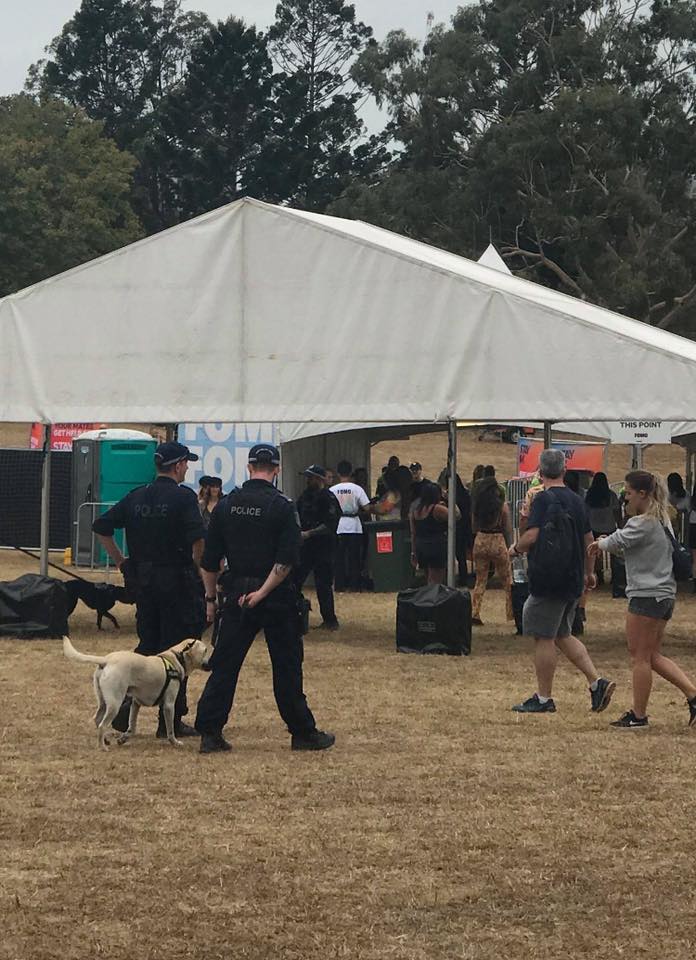
You’ve been the admin of the Sniff Off page for a number of years now. And as you mentioned, a positive drug dog indication is increasingly leading to members of the public being strip searched.
What sort of impact can this have?
Sniff Off receives dozens of messages every week detailing the traumatic experiences our supporters and their friends have with police.
Being strip searched is a severely debilitating experience, especially for children – current legislation allows police to strip search children aged 10 and over – as well as for survivors of sexual assault and intimate violence.
But even being questioned or harassed by police can itself be an intimidating experience that sours people’s trust in the police.
Many take sniffer dogs at the train station to be a regular part of daily life in Sydney. However, that wasn’t always the case.
Do you think we’re condemned to continue living in a community where sniffer dogs are the norm?
The drug dog program was introduced in 2001 by Bob Carr’s Labor government and has been supported by every Labor and Liberal state government ever since.
However, there has been a groundswell of community support for the abolition of the drug dog program and for the implementation of harm reduction strategies – such as pill testing – in the past few years.
The enormous growth of the Sniff Off campaign is a testament to that.
That leads me to my next question. The numbers of people following the Sniff Off campaign has grown dramatically over the last five years. What’s that telling us?
The people of NSW are sick of facing police intimidation and the possibility of an illegal strip search every time they catch a train or go to a music festival.
That’s why Sniff Off will continue to stand with the community in fighting for drug law reform, police accountability and the protection of civil liberties.
Lastly, Xiaoran, NSW premier Gladys Berejiklian or police minister David Elliot might claim that sniffer dogs are needed in the community to deal with drug issues. How would you respond to that?
The bottom line remains that the drug dog program is ineffective, invasive and a waste of public money.
It’s high time to end drug dogs and fund programs that actually treat drugs as a public health issue, not a criminal one and drug users as human beings, not criminals.



